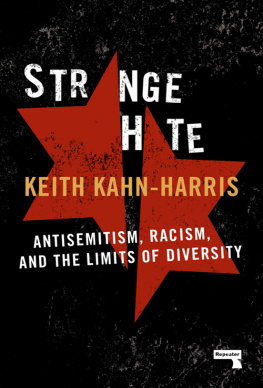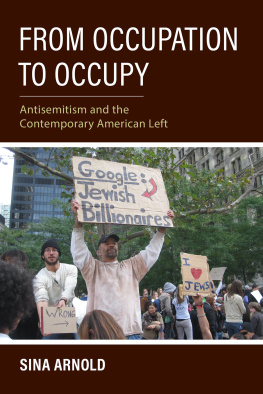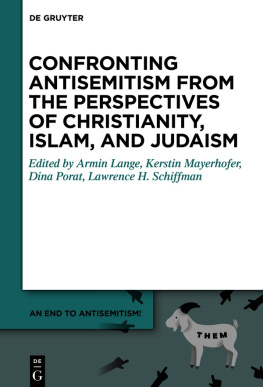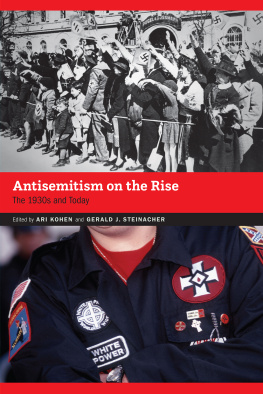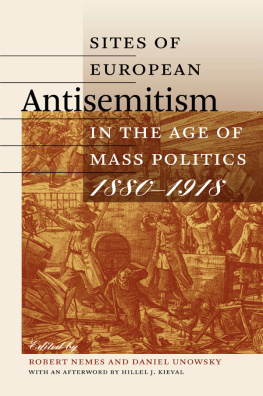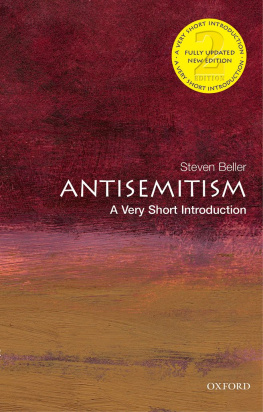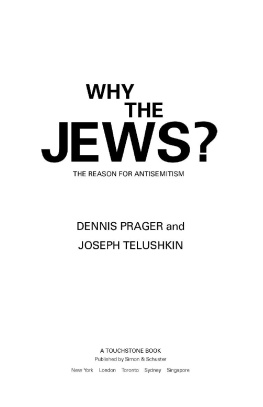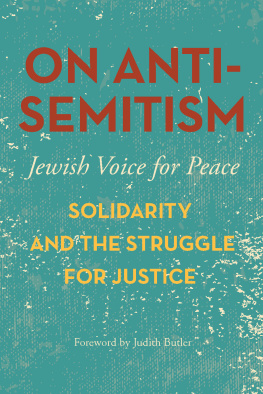Acknowledgments
It has not been my intention to preach to any choir in The Sons of Pigs and Apes, and I suspect that even generally well-intentioned and sympathetic souls may find themselves disagreeing with partsperhaps large partsof what I have written. The history of relations between Muslims and Jews, after all, has given rise to endless nuances of interpretation, and reasonable people may disagree. I ask only that readers try to understand and share my objective: to combat a dangerous bigotry so that Muslim-Jewish relations may develop on a firm and lasting foundation of truth and good will. While I have not focused on anti-Muslim bigotry in this volume, I hope I have made clear that it too must be opposed with vigor.
Although any errors of fact and interpretation in this book are, of course, my own, I have benefitted greatly from the assistance, counsel, and prior research of many wise people. Perhaps most significant was my affiliation with the now-shuttered Yale Initiative for the Interdisciplinary Study of Antisemitism, created and directed by Charles Small.
YIISA brought to campus many of the worlds leading luminaries on todays antisemitism and related issues. In April 2008 I attended a thought-provoking YIISA conference on Understanding the Challenge of Iran. The following year I participated in another stimulating event: the Dr. James Sacks Conference on psychological dimensions of contemporary antisemitism, which was cosponsored by the Anti-Defamation League. Most important of all was the superb August 2010 conference on Global Antisemitism: A Crisis of Modernity. Although this conference was denounced in harsh terms by Maen Rashid Areikat, the Palestine Liberation Organizations representative in the United States, and by several members of the anti-Israel radical Left (none of whom I believe attended the event), the presenters included more than a hundred top scholars from around the world. These scholars represented a broad range of political opinionleft, center, and righton the Arab-Israeli conflict, antisemitism, and other matters. Collectively, they had authored hundreds of books and journal articles and brought to the topic an unusually diverse set of backgrounds and methodological training. Although some of the presenters might, I think, disagree with parts of this book, I found the conference to be one of the best I had attended in recent years.
At various YIISA conferences, the YIISA lecture series, and other events, I had the opportunity to hear the views and insights of many scholars, journalists, political leaders, and human rights activists from around the world, including Hadassa Ben-Itto, David Cesarani, Phyllis Chesler, Patrick Clawson, Shoaib Choudhury, Irwin Cotler, Shalem Coulibaly, Robert Fine, Andrs Ger, Nora Gold, Daniel Goldhagen, Erich Goldhagen, Diana Gregor, Yossi Klein Halevi, Jeffrey Herf, Anne Herzberg, David Hirsh, Gilbert Kahn, Mehrangiz Kar, Berthe Kayitesi, Yaakov Kirschen, Jytte Klausen, Barry Kosmin, Richard Landes, Jacob Lassner, Leslie Lebl, Meir Litvak, Kenneth Marcus, David Menashri, Menahem Milson, Stephen Norwood, Orly Rahimiyan, Paul Lawrence Rose, Alvin Rosenfeld, Hannah Rosenthal, Jennifer Roskies, Barry Rubin, Michael Rubin, Thyme Siegel, Ernest Sternberg, Asher Susser, Bassam Tibi, Robert Wistrich, and Ben-Dror Yemini. In each case, I was enriched by the encounter. In addition, the YIISA video archive enabled me to benefit from many presentations that I was unable to attend in person.
YIISA also brought to New Haven a politically diverse and talented group of postdoctoral and predoctoral fellows, including, among others, Idit Shalev, Ulrike Becker, and Joshua Kaplan.
Lauren Clark, the coordinator of YIISA, was always helpful to me beyond the call of duty.
YIISA was also where I met German scholar Clemens Heni, a tireless foe of antisemitism in all its forms. Clemens, who heads the Berlin International Center for the Study of Antisemitism, read a draft of this book and gave me much useful feedback.
The recently established Journal for the Study of Antisemitism (JSA), edited by Steven K. Baum and Neal E. Rosenberg, has taken a much-needed step toward encouraging research on Jew-hatred in the past and, more importantly, in the understudied present. A 2010 conference sponsored by the journal broached the topic of Muslim antisemitism, something that many academics have been unwilling or unable to consider.
In addition, a team of social psychologists, headed by Lee Jussim and Florette Cohen, has started to address the near total absence of empirical social psychological studies on contemporary antisemitism, a gap that is curious in light of the disciplines seminal role in understanding Jew-hatred and other bigotries in the past. I hope that Jussim and Cohens work, presented at YIISA and the JSA conference, will get the attention of mainstream social psychologists. I am also grateful to Jussim for presenting his work at William Paterson University, where I am a professor.
Among the people I have contacted during research for this book, scholars Irfan Khawaja and Rifat Bali were especially insightful.
I am not affiliated with the Middle East Media Research Institute in any way, and mainly I have accessed the institutes work online. However, this book could not have been written without the highly professional monitoring and translation services of MEMRI. The documentation of antisemitism is only a small part of what this organization has accomplished; it has, for example, become an essential part of the Wests counterterrorism effort. It also has made inroads into the documentation of emerging moderate voices in the Islamic world. Needless to say, despite its great efforts to maintain balance and objectivity (or possibly because of these efforts), MEMRI has been repeatedly denounced in vile terms in some circles. (For example, an Egyptian presidential candidateunhappy that some of his words had been recorded, translated, and transmitted to a Canadian journalistreferred to MEMRI as that piece of crap.) Thankfully, the major Western media and policy elites appear to realize its worth.
Two academic institutes deserve special mention for their excellent pioneering work on contemporary antisemitism: the Vidal Sassoon International Center for the Study of Antisemitism at the Hebrew University in Jerusalem and the Stephen Roth Institute for the Study of Contemporary Antisemitism and Racism at Tel-Aviv University. More recently, the Institute for the Study of Contemporary Antisemitism at Indiana University has also become a valuable resource.
At William Paterson University, the Center for Holocaust and Genocide Studies has helped to keep past antisemitism and twentieth-century genocides in the consciousness of students, faculty, and the surrounding community. For more than a decade, I have had the opportunity to team-teach a freshman honors course on diversity and hatred with biologist Miryam Wahrman, the cofounder of the center, and other colleagues. Spirited interaction with each of these colleagues has been a pleasure. I also thank Miryam for reading early drafts of the manuscript. My longtime colleague, social psychologist Tom Heinzen, provided useful input throughout the writing of this book. Additionally, I thank my many other colleagues in the psychology department for maintaining a stimulating and intellectually open-minded atmosphere for scholarship and teaching.
Bill and Harriet Mohr, the founders of the Haiti Jewish Refugee Legacy Project, have been the source of much encouragement, and I am grateful to their organization for the Tikkun Olam Award conferred in 2011 for my work on antisemitism in the Muslim world.
Over the years, journalist Adam Brodsky has been a buddy, coauthor, critic, editor, and brother-in-law; I thank him for his superb performance in all those capacities.


